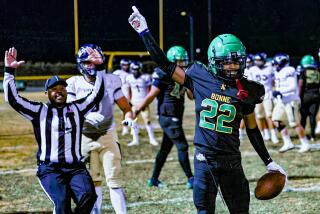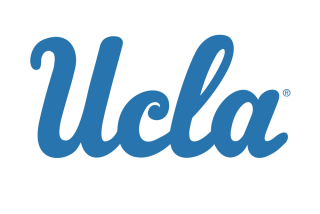Oklahoma State Receives 4-Year NCAA Probation
- Share via
STILLWATER, Okla. — Oklahoma State’s extensive cooperation, including the testimony of players who gave information in return for their eligibility, saved the Cowboy football program from the National Collegiate Athletic Assn.’s death penalty, but not from a 4-year probation that includes the loss of bowl games, live television and scholarships, according to a report released Friday announcing sanctions against the school.
Because of more than 40 violations, the more serious involving cash-and-car packages to at least one star player, Oklahoma State will be prohibited from playing in bowl games for the next 3 seasons, will be banned from live TV for the next 2 and will lose 5 scholarships in each of the next 3.
The penalty, which is Oklahoma State’s second in the last 10 years--the Cowboys were put on probation in 1979 for 2 years--could have been much worse. The NCAA report said the case does not fall under the “repeat” major violators provision, which makes the death penalty--the elimination of a sport--automatic.
NCAA officials also considered eliminating 3 conference home games, but “in view of the thorough investigation and the cooperation extended by the present administration and coaching staff in bringing this case to a conclusion, the committee will withhold the application of the penalty,” the report said.
Oklahoma State, often an also-ran in the Big Eight Conference, just finished a 10-2 season with a victory in the Holiday Bowl. The Cowboys figured to become a showcase team next season with the return of Heisman Trophy winner Barry Sanders.
But because the Cowboys, however good a season they have, have not gone to major bowls or even appeared on network TV recently, the sanctions will have a relatively minimal impact, say school officials.
Coach Pat Jones seemed to echo the sigh of relief that was heard over the campus after the penalties were announced. “I was surprised good,” he said. “We’ve got more scholarships than I thought I might. The number reduced, very, very minimal. The heart of the program was not cut out.”
Moreover, he said, he talked with Sanders, his star running back, Thursday, and said, “Barry will be back next year and people will get to try and tackle him again.”
Speculation has been widespread hereabouts that Sanders, though a true junior, would try to move directly to the National Football League, especially if Oklahoma State was penalized.
Some kind of penalty, whether more severe or not, had been anticipated since the NCAA told the university of its investigation in early 1986. Reports of cash payments to induce a recruit to sign a scholarship and subsequent monthly payments have circulated for some time. It appears that the NCAA was able to prove what was suspected.
Although the NCAA report provided no names in outlining the violations, it has been widely reported that Willie Anderson was the “former assistant coach” referred to in the report. That coach is reported to have provided star receiver Hart Lee Dykes with $5,000 in cash, monthly payments of $125 the first year and $200 the second, and “the provision of an expensive and distinctive sports car at no cost to the young man.”
The former assistant coach, who left the staff in 1986, was identified as having been previously cited for violations at another school, the report said. Anderson, who was hired by Jimmy Johnson before Johnson left for Miami, previously coached at Clemson, which was placed on NCAA probation in 1982.
The former assistant coach figured in the first, and more serious, 16 infractions. The other violations deal with free travel for athletes, girlfriends, and lesser violations.
Other former assistants are also believed involved.
Almost all the violations occurred between 1982 and 1986.
Anderson has since become a minister at Mount Zion Baptist Church and also operates as a professional agent, representing a minor league baseball player and gospel singer. In an interview with the Daily Oklahoman Friday, he said: “What I did was not immoral or against Christ’s teachings. All I’ve ever done is help people.”
The NCAA, which had cited Oklahoma State in 1979 because of a “slush fund” operated by boosters, was not impressed with the school’s return to rule violations, even if they were at least different in nature. However, the gusto with which Oklahoma State helped NCAA investigators prepare their case was a factor in mitigating the punishment.
Mike Glazier, a former NCAA investigator who now works for a Chicago law firm that conducts investigations for schools, said: “What the NCAA was impressed with was how committed the administration was to finding out what was going on. By the time the case got to the hearing process, they didn’t have an issue remaining.”
In fact, Oklahoma State did more than cooperate. It appears to have made the case. Not only did Oklahoma State self-report 11 of the violations, but Glazier and his operatives, who were hired by Oklahoma State almost as soon as the NCAA announced its own interest, turned up 12 players, including Dykes, who were willing to testify to the serious infractions if their eligibility could be protected.
“The number of players is probably higher than other cases,” said Glazier, who added that he has worked both sides of the desk in many major ones. “But there probably have been very few cases where limited immunity has not been a significant part of the case.”
According to Glazier, the NCAA even has a provision, that allows the use of immunity as an investigative tool.
“It begins with the request from a student-athlete, who has information that would otherwise be unavailable,” he said.
He said that in the summer of 1987, Jones gathered his players to advise them of the investigation and insisted he wanted the truth known. At that point, Glazier said, the players said, OK, but asked what would happen to their eligibility. “That leads to the immunity process,” Glazier said.
Initially it was thought that only Dykes provided key testimony, possibly providing the information that led to similar sanctions at Oklahoma, where he was also recruited. But there was additional cooperation.
“That it works to this degree is unique,” Glazier admitted. “Certainly the committee on sanctions was very impressed with our ability to get information. And we did get some valuable information.”
That lessened the punishment. Glazier, who had been an assistant director in enforcement before he left the NCAA, said: “That they gave 3 games back, to my mind, that’s significant.”
Oklahoma State president John Campbell, who came to the school last year, said he began to think the school at least wouldn’t get the death penalty after his last session with the NCAA. But Athletic Director Myron Roderick said the threat remained.
Roderick said he was highly motivated to begin a thorough and independent investigation because “with that death penalty out there, you better clear your slate.”
In any event it appears that full disclosure is highly valued by the NCAA. It was worth at least 3 games on next season’s Oklahoma State schedule.
NCAA PENALTIES
* The football team cannot play in postseason games until after the 1992 season.
* During the 1989 and 1990 seasons, the football team cannot appear on television.
* The university will lose 5 scholarships in football each year until 1992.
* The number of official paid visits for prospective athletes will be limited to 50, instead of 85, each year until 1991.
* The university will report actions that it has taken during the probationary period to bring its athletic program into compliance with NCAA legislation.
* The university will show cause why it should not be penalized further if it fails to disassociate 14 boosters from the athletic program.
More to Read
Go beyond the scoreboard
Get the latest on L.A.'s teams in the daily Sports Report newsletter.
You may occasionally receive promotional content from the Los Angeles Times.










